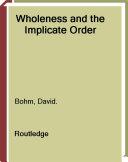
Wholeness and the Implicate Order (1980)
Context: My suggestion is that at each state the proper order of operation of the mind requires an overall grasp of what is generally known, not only in formal logical, mathematical terms, but also intuitively, in images, feelings, poetic usage of language, etc. (Perhaps we could say that this is what is involved in harmony between the 'left brain' and the 'right brain'). This kind of overall way of thinking is not only a fertile source of new theoretical ideas: it is needed for the human mind to function in a generally harmonious way, which could in turn help to make possible an orderly and stable society. <!-- p. xi
